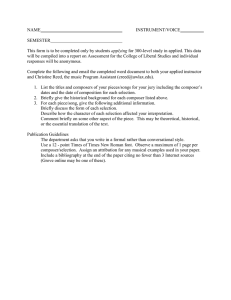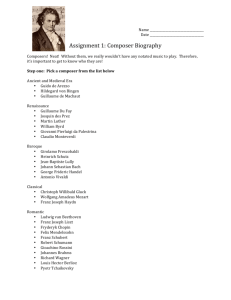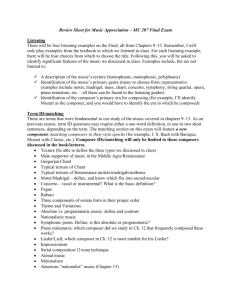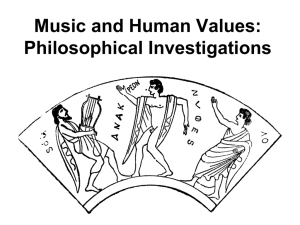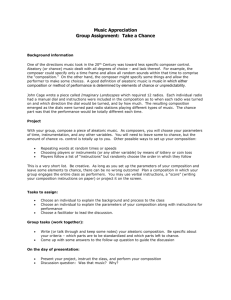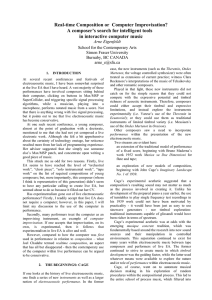CREATING WITH REACH
advertisement
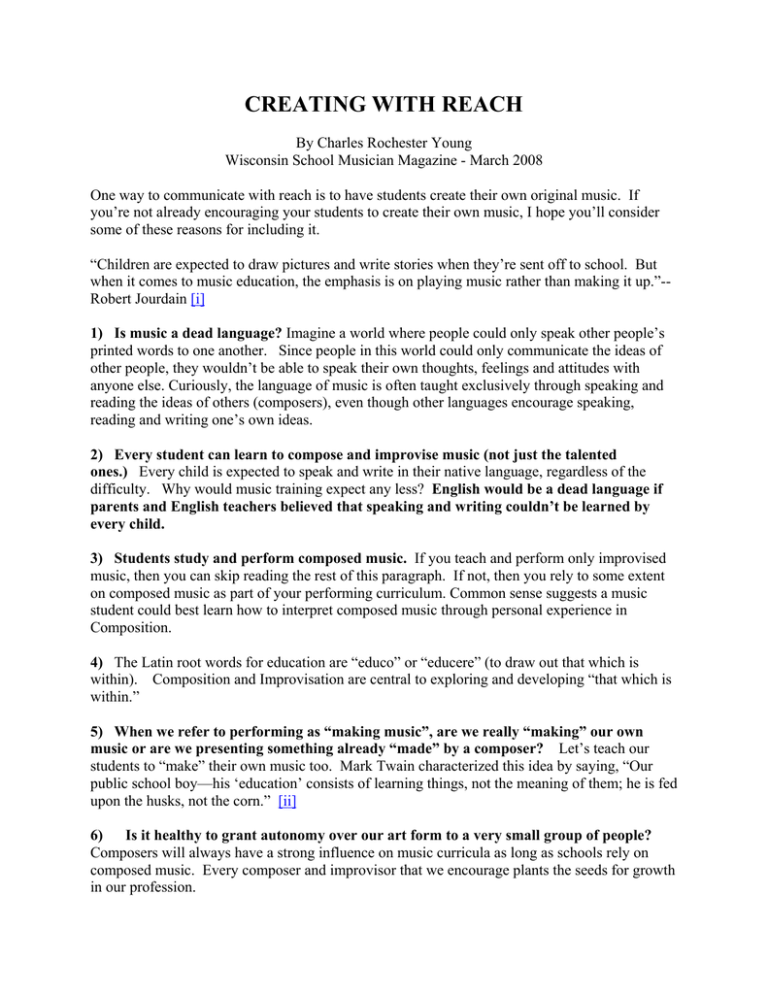
CREATING WITH REACH By Charles Rochester Young Wisconsin School Musician Magazine - March 2008 One way to communicate with reach is to have students create their own original music. If you’re not already encouraging your students to create their own music, I hope you’ll consider some of these reasons for including it. “Children are expected to draw pictures and write stories when they’re sent off to school. But when it comes to music education, the emphasis is on playing music rather than making it up.”-Robert Jourdain [i] 1) Is music a dead language? Imagine a world where people could only speak other people’s printed words to one another. Since people in this world could only communicate the ideas of other people, they wouldn’t be able to speak their own thoughts, feelings and attitudes with anyone else. Curiously, the language of music is often taught exclusively through speaking and reading the ideas of others (composers), even though other languages encourage speaking, reading and writing one’s own ideas. 2) Every student can learn to compose and improvise music (not just the talented ones.) Every child is expected to speak and write in their native language, regardless of the difficulty. Why would music training expect any less? English would be a dead language if parents and English teachers believed that speaking and writing couldn’t be learned by every child. 3) Students study and perform composed music. If you teach and perform only improvised music, then you can skip reading the rest of this paragraph. If not, then you rely to some extent on composed music as part of your performing curriculum. Common sense suggests a music student could best learn how to interpret composed music through personal experience in Composition. 4) The Latin root words for education are “educo” or “educere” (to draw out that which is within). Composition and Improvisation are central to exploring and developing “that which is within.” 5) When we refer to performing as “making music”, are we really “making” our own music or are we presenting something already “made” by a composer? Let’s teach our students to “make” their own music too. Mark Twain characterized this idea by saying, “Our public school boy—his ‘education’ consists of learning things, not the meaning of them; he is fed upon the husks, not the corn.” [ii] 6) Is it healthy to grant autonomy over our art form to a very small group of people? Composers will always have a strong influence on music curricula as long as schools rely on composed music. Every composer and improvisor that we encourage plants the seeds for growth in our profession. 7) Teaching Composition and Improvisation in music classrooms isn’t just about producing professional composers or improvisors. Just imagine where society would be if English teachers only thought writing classes were to produce novelists! Composition and Improvisation education is about teaching students how to communicate with others and develop their own problem solving skills. 8) Composition and Improvisation will help students perform better. In spoken language, the composer and performer are the same person! Are we surprised that many of our greatest performers throughout history were also improvisors and composers? 9) Composition and Improvisation teach students how to think IN music not just think ABOUT music. “Students learn effectively…when their artistic learning is anchored in artistic production…Talk about music is an ancillary form of knowledge, not to be taken as a substitute for ‘thinking’ and ‘problem solving’ in the medium itself.”—Howard Gardner [iii] 10) How often do students experience an unfinished piece of music? Experiencing “work in progress” helps them to realize that composing is a process or series of choices, rather than an elusive or mysterious act. 11) Creative experiences, such as the birth of a child or an original work, can provide some of life’s most meaningful moments. Mark Twain described this saying, “What is it that confers the noblest delight? What is that which swells man’s breast with pride above that which any other experience can bring to him? Discovery! To know that you are walking where none others have walked; that you are beholding what human eye has not seen before; that you are breathing a virgin atmosphere. To give birth to an idea---to discover a great thought.” [iv] 12) Composition and Improvisation are among the oldest practices in music. In his book, MUSINGS, Pulitzer-prize winning composer Gunther Schuller said, “We forget that the musician of the sixteenth, seventeenth, and eighteenth centuries was rarely just a composer or just an instrumentalist. If he was an oboist, he was also a composer and perhaps a pianist; if he was a composer, he was also perhaps a flutist or an organist. The creative and re-creative aspects of music were an integral balance in such a musician’s musical constitution, and the one fructified the other.” [v] 13) Learning to talk can be the greatest intellectual leap of an individual’s life….it can also provide the critical foundation for much of what we consider to be intelligent behavior. Having our students speak music can be of equal benefit. 14) Creating never goes out of style. We can prepare our students for the future by having them create that future. 15) Ideas are the single most valuable commodity that humans have. Albert Einstein agreed saying, “Imagination is more important than knowledge.” [vi] 16) Every child learns to think, listen, speak, read and write using language. Let’s teach every child how to think, listen, speak, read and write in music too—not just the talented ones. 17) Composing and Improvising are MENC National Standards. These standards reflect the highest aims and practices in our profession. I encourage each of you to consider including Composition and Improvisation in your curriculum. I can only hope that you will find as rewarding and inspiring as I have throughout my teaching career at UW-Stevens Point. “Never doubt that a small group of thoughtful, committed citizens can change the world. Indeed, it is the only thing that ever has.”—Margaret Mead [vii] AUTHOR Dr. Charles Rochester Young is the Coordinator of Composition and Music Theory at UWStevens Point. Dr. Young has received numerous awards in Composition from ASCAP, Meet the Composer, National Association of Composers USA, National Band Association, National Flute Association, and the International Bassist Federation among many others. Dr. Young has more than 30 published and recorded commissions from a wide range of organizations. In 1999, Dr. Young was named “Wisconsin Professor of the Year” by the Carnegie Foundation and in 2000 received the UW System Board of Regents Career Teaching Excellence Award. Dr. Young can be reached via e-mail: cyoung@uwsp.edu or phone: (715) 346-3852. ENDNOTES [i] Robert Jourdain, Music, the Brain, and Ecstasy (NY; Avon Books, 1997), 186 [ii] Alex Ayres, The Wit and Wisdom of Mark Twain (NY: Harper and Row, 1987), 67 [iii] J. Paul Getty Trust, Art Education and Human Development (Los Angeles, J. Paul Getty Trust, 1990), 42-49 [iv] Alex Ayres, The Wit and Wisdom of Mark Twain (NY: Harper and Row, 1987), 60 [v] Gunther Schuller, Musings (Oxford: Oxford Press, 1986), 244 [vi] Robert G. Torricelli, Quotations for Public Speakers (New Brunswick: Rutgers Press, 2001), 135 [vii] John A. Murray, The Quotable Nature Lover (NY: Lyons Press, 1999), 182
